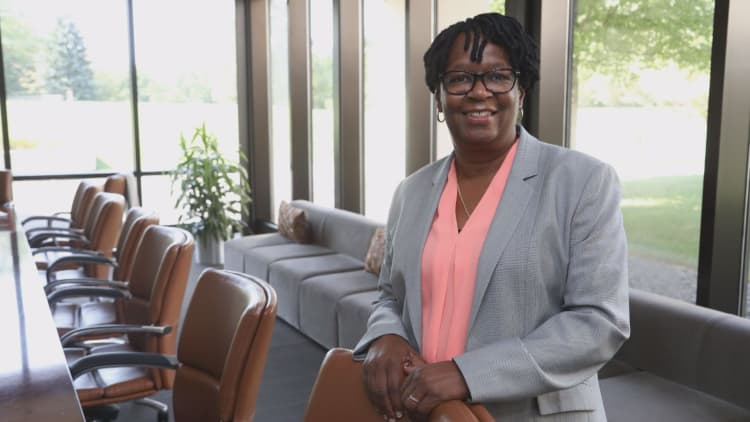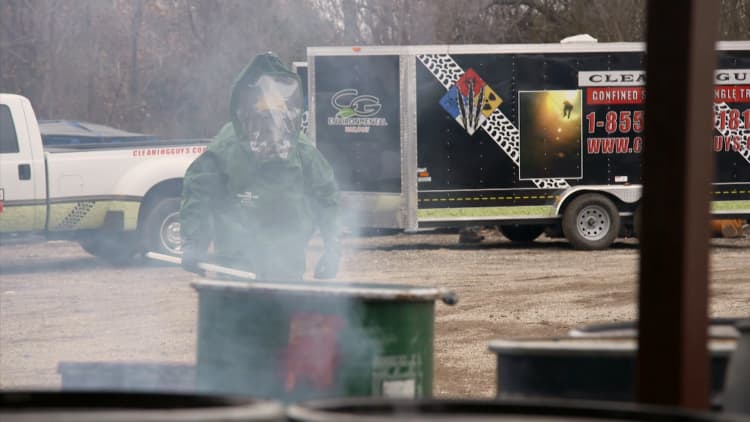Texas-based CG Environmental is making millions from a dangerous and dirty job — cleaning up everything from crime scenes to chemical spills and dealing with all manner of scary substances, like radioactive waste, toxic sewage and and infectious bodily fluids.
"The job we do would make a lot of people pee a little," is how founder and CEO Erick McCallum describes it.
The business is expected to gross $20 million in sales in 2017, a company spokesman tells CNBC Make It. And McCallum's team is earning every penny.
"If something is glowing, we're probably going to step back and talk for a minute and figure it out, but other than that we've handled it," McCallum says on CNBC's "Blue Collar Millionaires." "We roll up on scenes where we've got people down and no one can go in. We deal with things that can kill you with one breath."
McCallum says CG Environmental cleaned up millions of gallons of flood water in Houston after Hurricane Harvey destroyed the city this year. In 2014, they answered the call to decontaminate the Dallas apartment of an Ebola victim, and that job alone cost upwards of $100,000, The USA Today reports.
"The grey hair doesn't come from age, it comes from what I do for a living," says McCallum, 48.
Before founding his business, McCallum worked as a police officer in Mansfield, Texas. Then, as a 25-year-old, he decided to go into business for himself and start a business cleaning carpets. To get started, he emptied his savings to buy a van and some cleaning equipment.
"The whole van with equipment and everything was $5,000," McCallum says. "It was a pretty ratty van. It had rust holes in the floor — I told people that if I dropped my sunglasses they'd be on the highway behind me — when I say rust holes, I mean there was no floorboard in it."
He started as a one-man operation: booking jobs and doing them himself too.
"It was all by myself," he explains. "I scratched up everything I could get to get that van put together, and away I went."
At first, the work was cleaning carpets at residential homes and apartment complexes, and then it grew to big corporate clients. "I had landed a couple of big companies, they had a lot of square footage of carpet, where I would go in and have to clean it all through the weekends." But, that hustle paid off.
"These companies would have problems," McCallum explains, other odd jobs that they needed to have handled. Since he was developing a reputation as the guy to call to get a job done, they would ring him up. For example, a company with a location in Dallas needed a highway sign taken down, and fast. So, they called McCallum.
"[It] was called Pillowtex, and they had a giant sign that was a landmark, and this sign was huge. Bigger than any highway sign you've ever seen," he explains. "They called me and said the president of the company wanted the sign down by Monday morning when he rolls in, and this was Friday afternoon."
"I had just had a vasectomy and I was very sore, and I told them, 'No problem, we'll get it done!' and I had no idea how were were going to do it," he laughs. "But we had some bulldozers and blow torches and knocked this thing down."
The lesson he learned was that building relationships meant building his business: "When you're a small company, you don't turn anything down. You figure it out," he explains.
McCallum grew his staff as the jobs continued to get bigger and started to become focused on cleaning up big spills or working with garbage companies. The work became labor intensive, so McCallum — who has no formal engineering experience besides working on cars and welding in his garage — began to design his own machine to get jobs done faster.
"I started putting equipment together that would clean and suck everything up at the same time," he says. "I've always built things and put things together and been mechanical."
He now holds a patent on that machine, nicknamed 'The Annihilator,' by his employees, which can clean an area measuring 8 feet by 50 inches in 30 seconds, according to the company. The process to build the first one took six to eight months of McCallum working day and night.
"There were a number of mornings my guys would roll in to come to work and I'd be in the shop underneath it asleep because I'd been working on it all night," he says. "I had it in my head, I knew how it could be put together."
That technology enabled him to escalate the amount of work his company could do. As the business got bigger, the jobs got grosser. When asked which has been the grossest, McCallum says there is one thing that comes to mind: catfish.
"We had a big flood that came through, and Arlington Lake had overflowed. The creeks were full, and when it overflowed, it pushed giant 20- and 30-pound catfish into these creeks. When the creeks went down, we had thousands and thousands of fish that were dead, and every exposed part had maggots on them," he explains. "Every crew member of mine threw up multiple times."
But, that means more success for the business. As McCallum puts it: "Danger equals dollars."
Don't miss: How a janitor went from cleaning floors to the C-suite as a 6-figure tech exec
Like this story? Like CNBC Make It on Facebook




